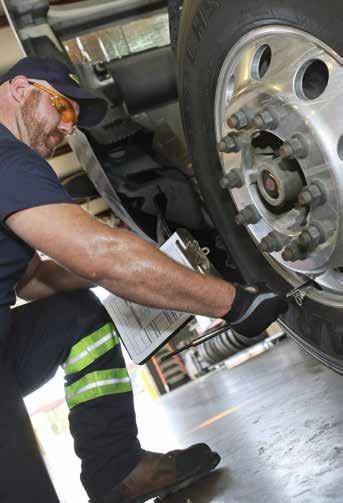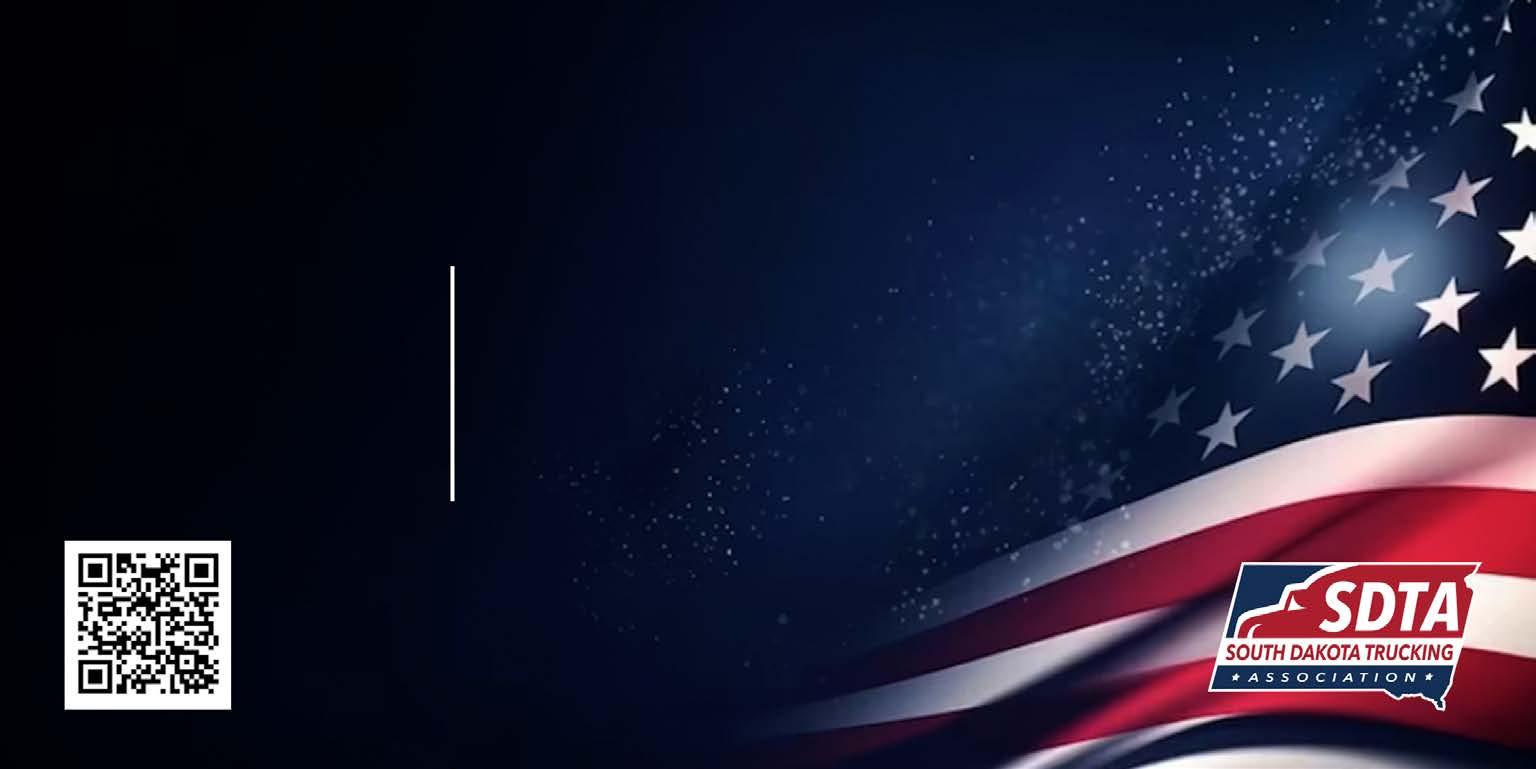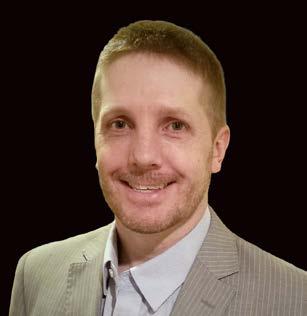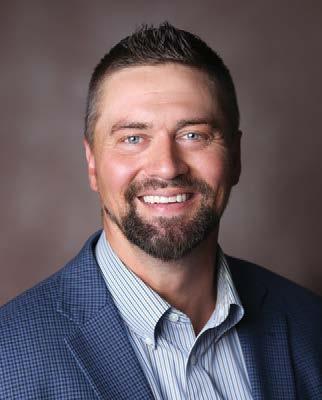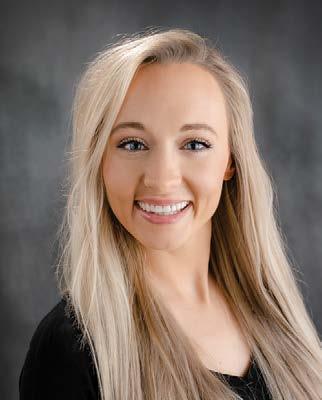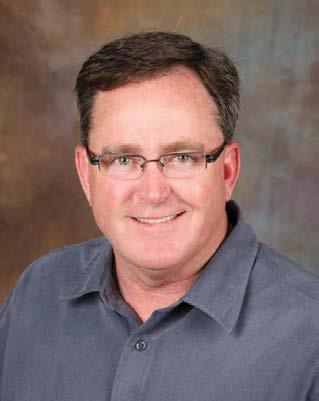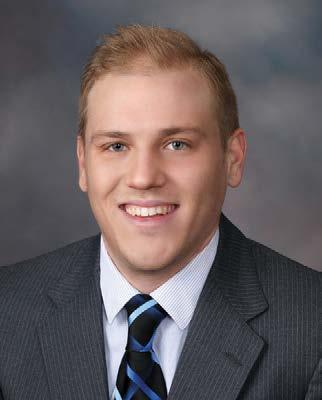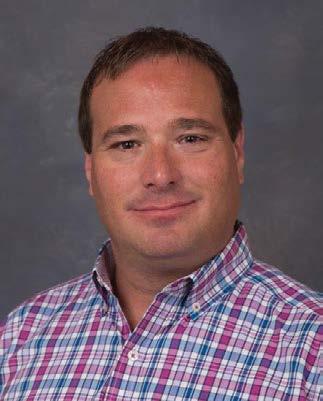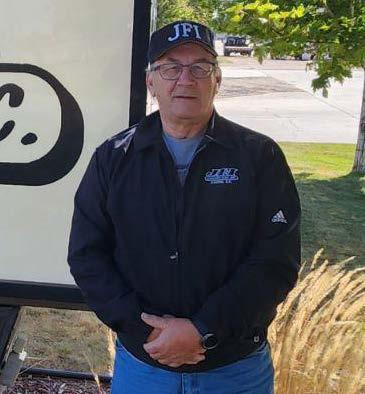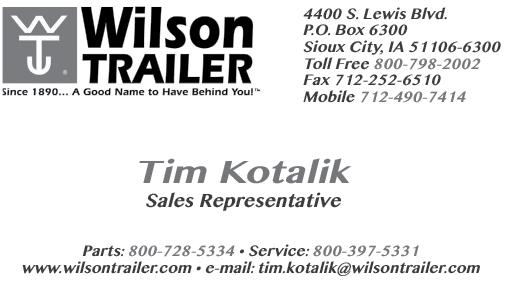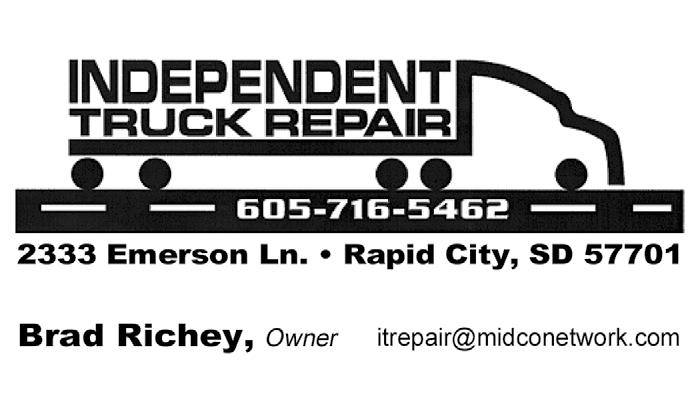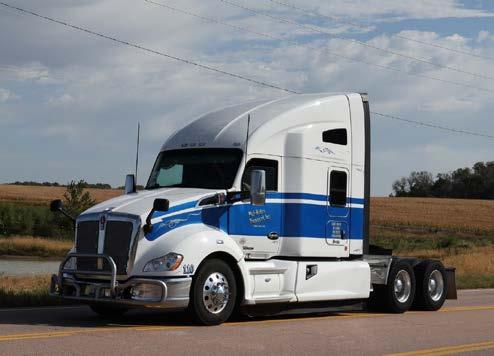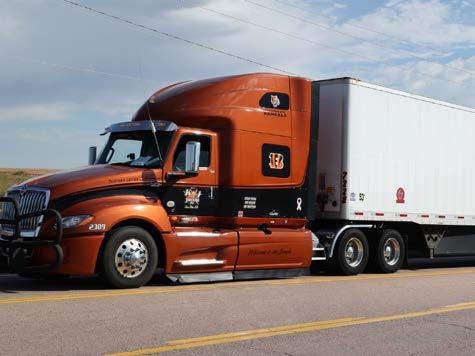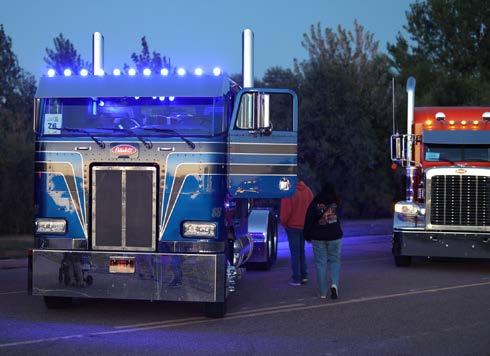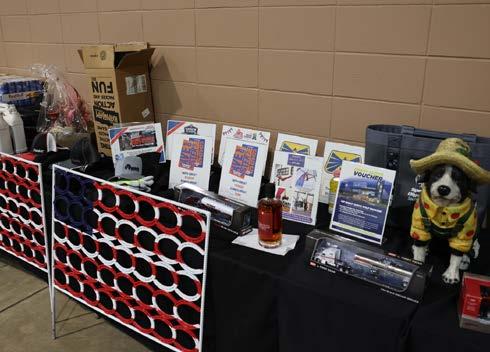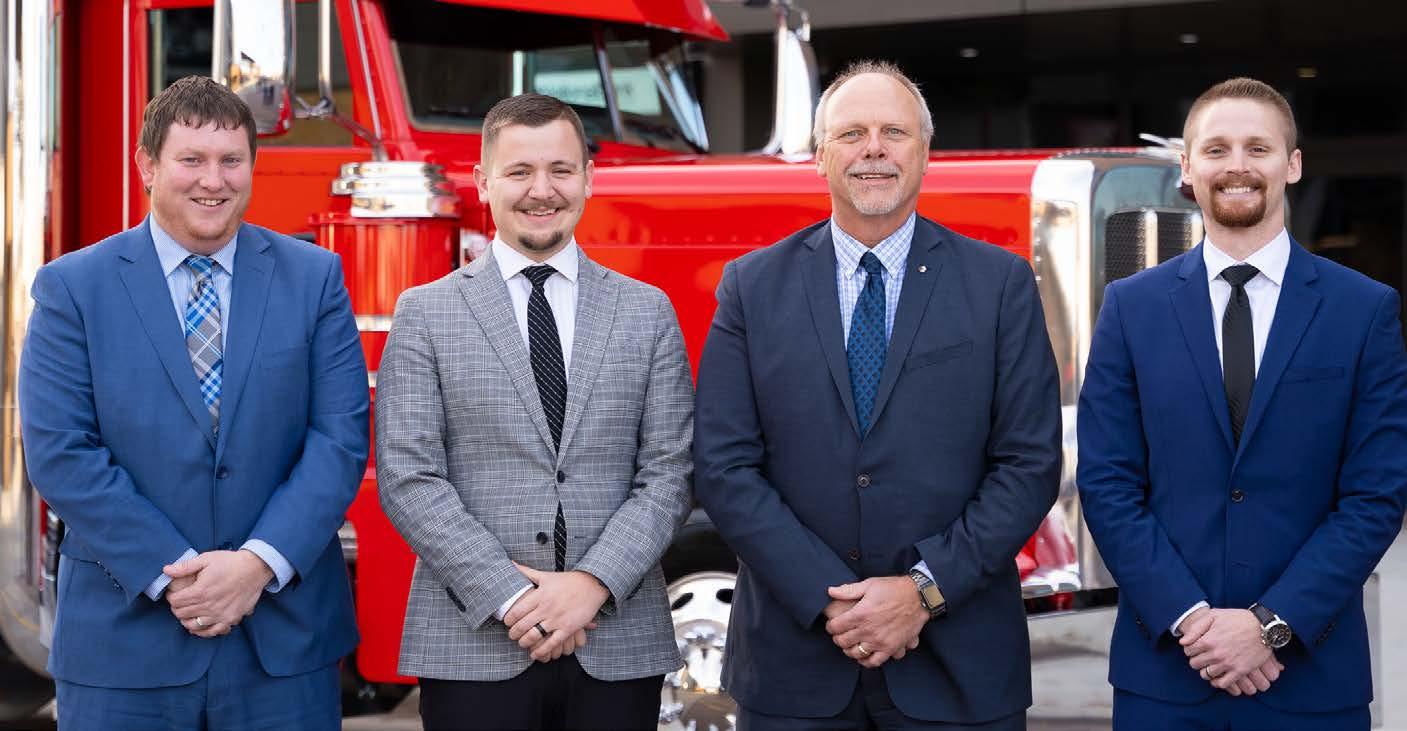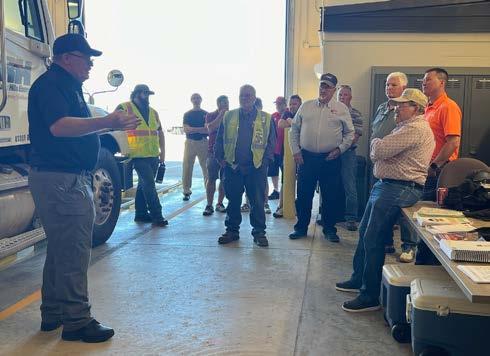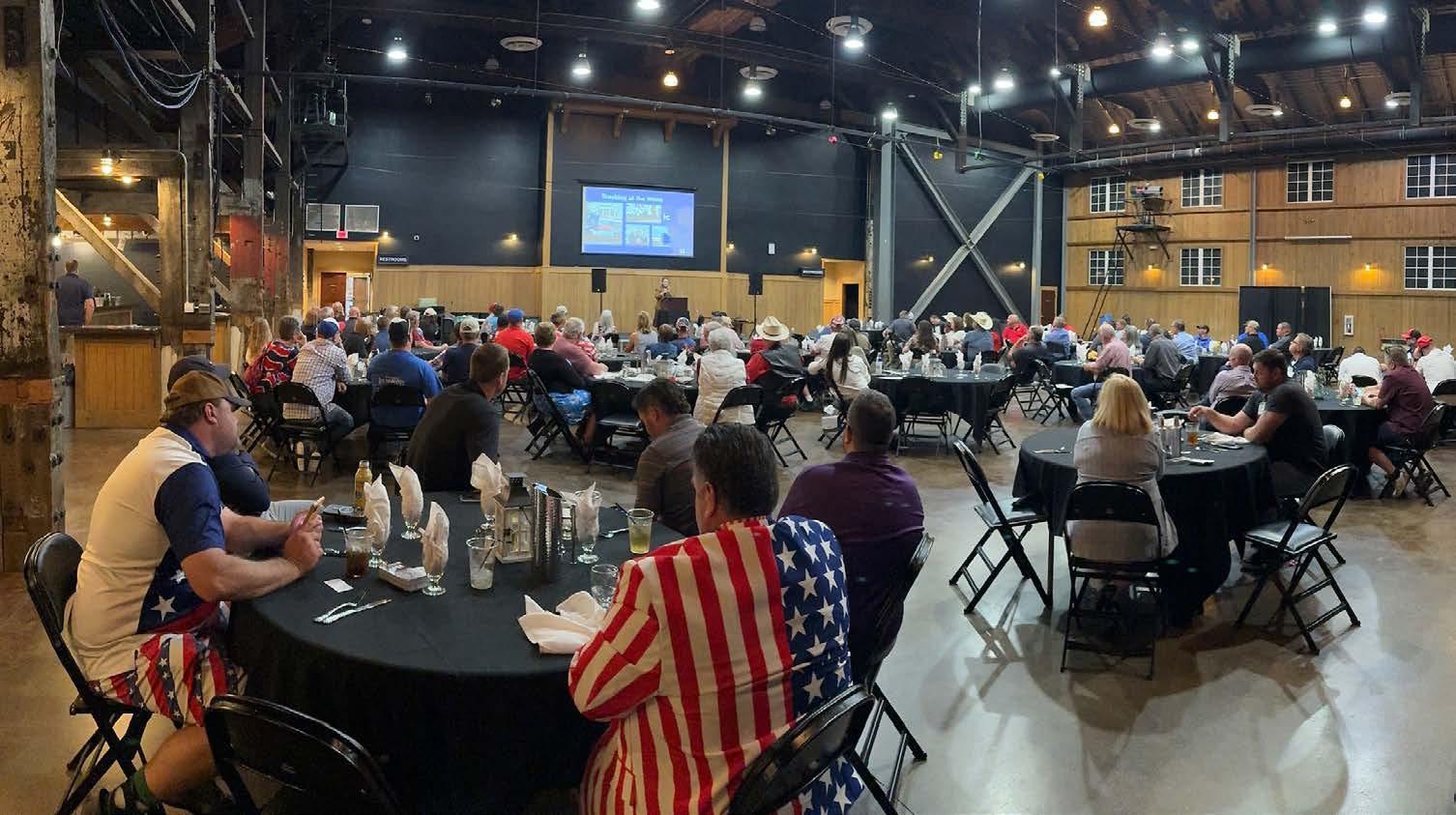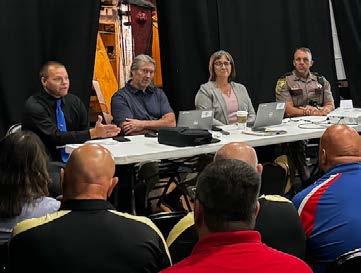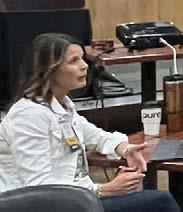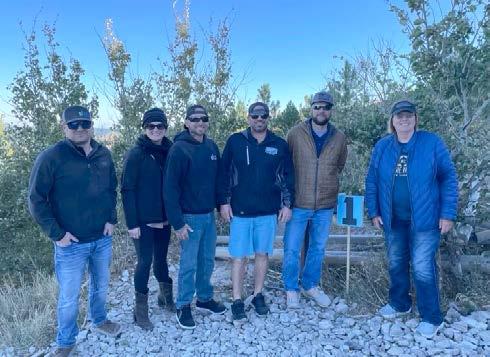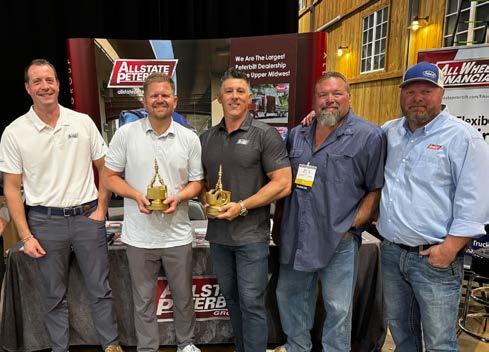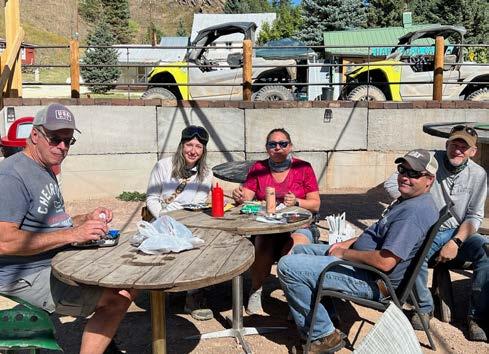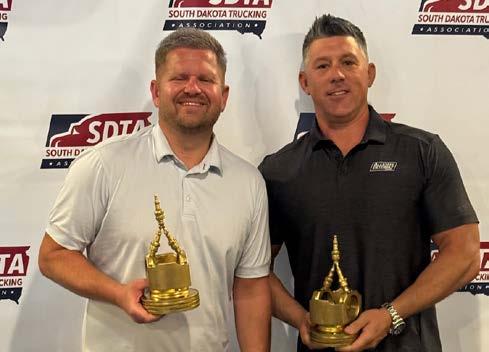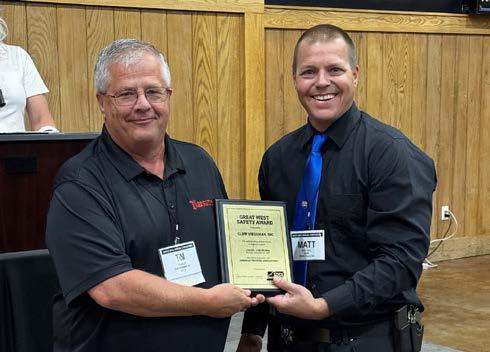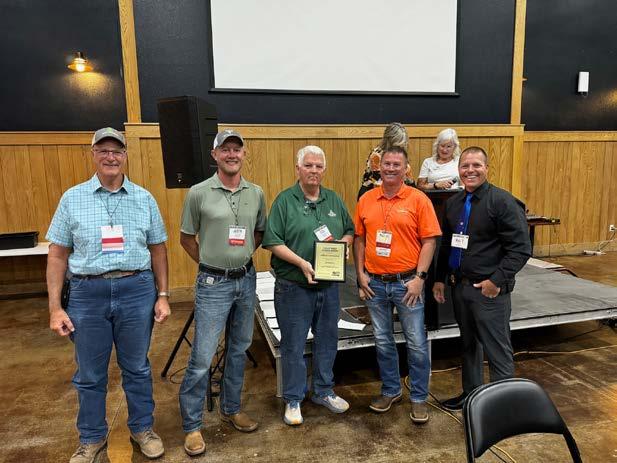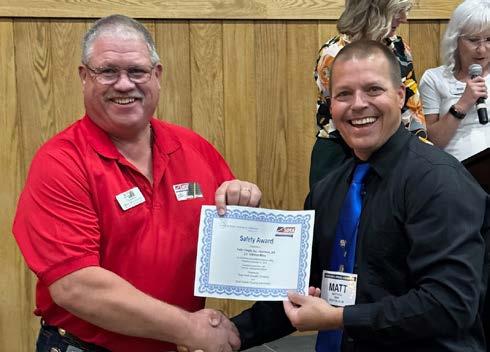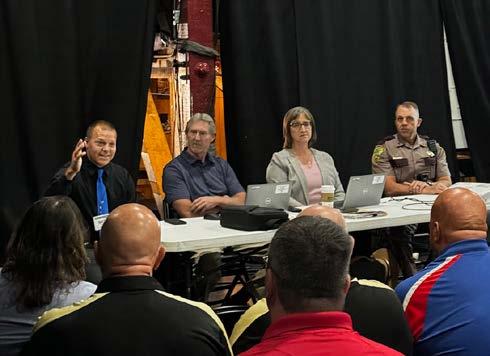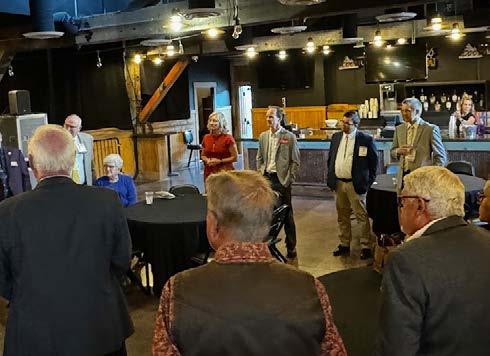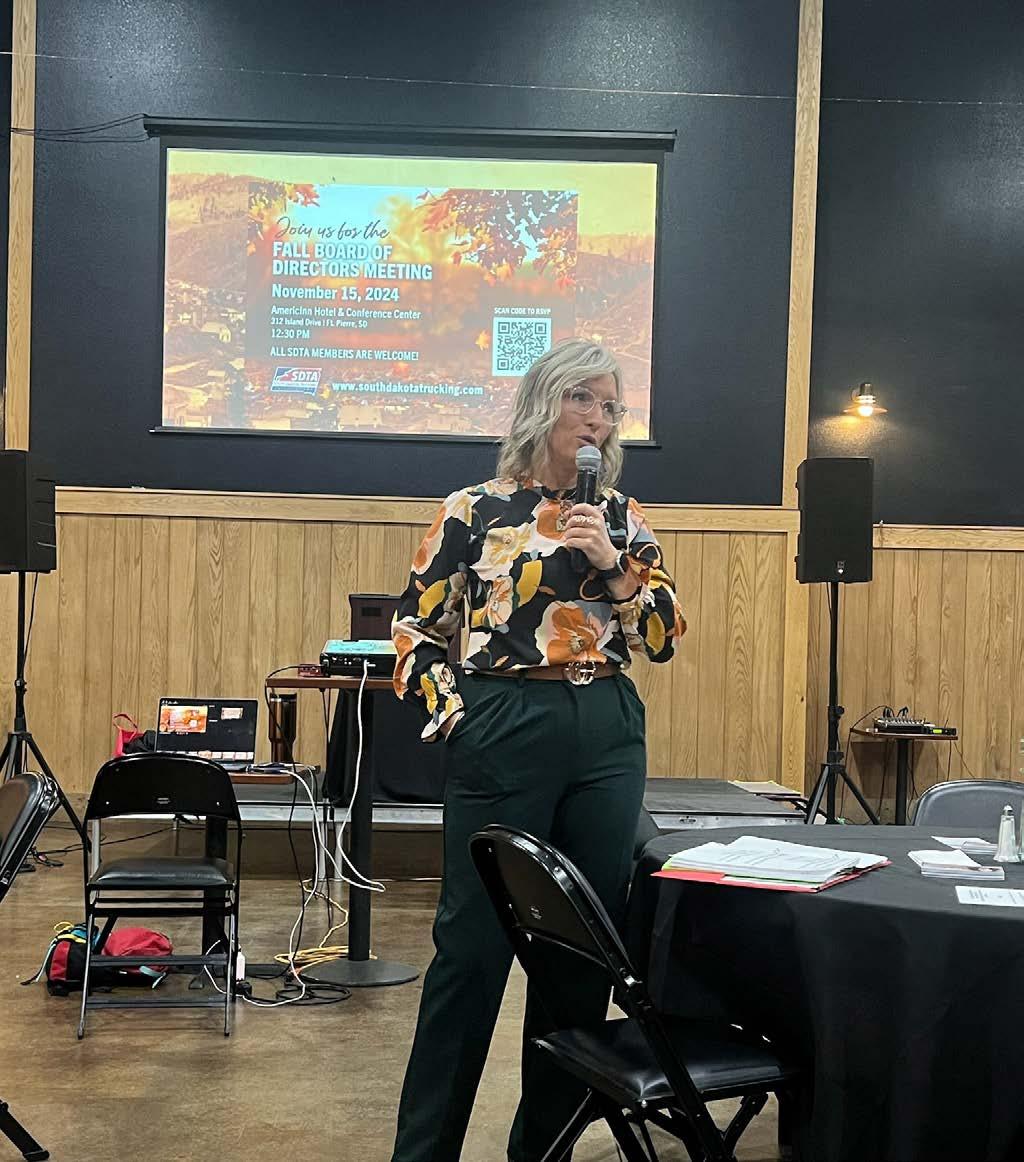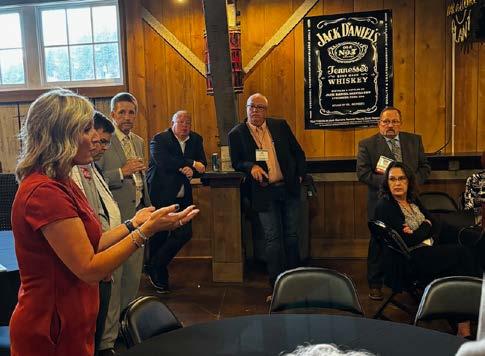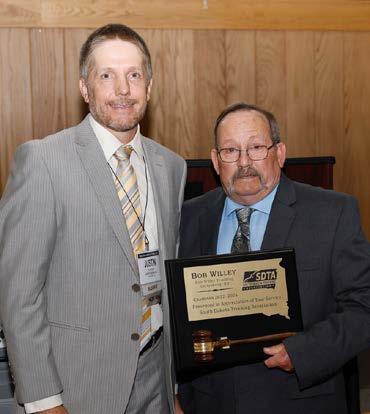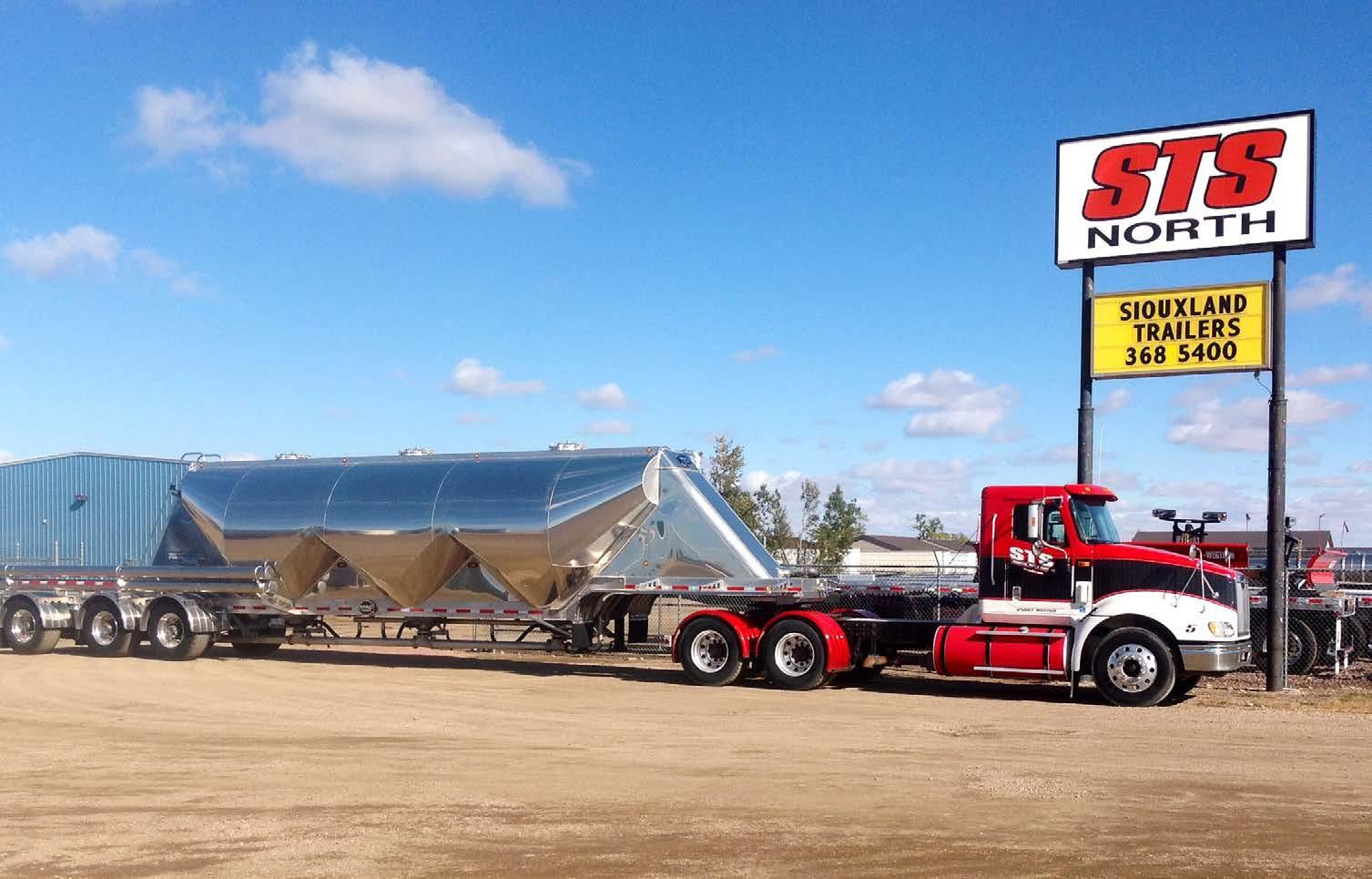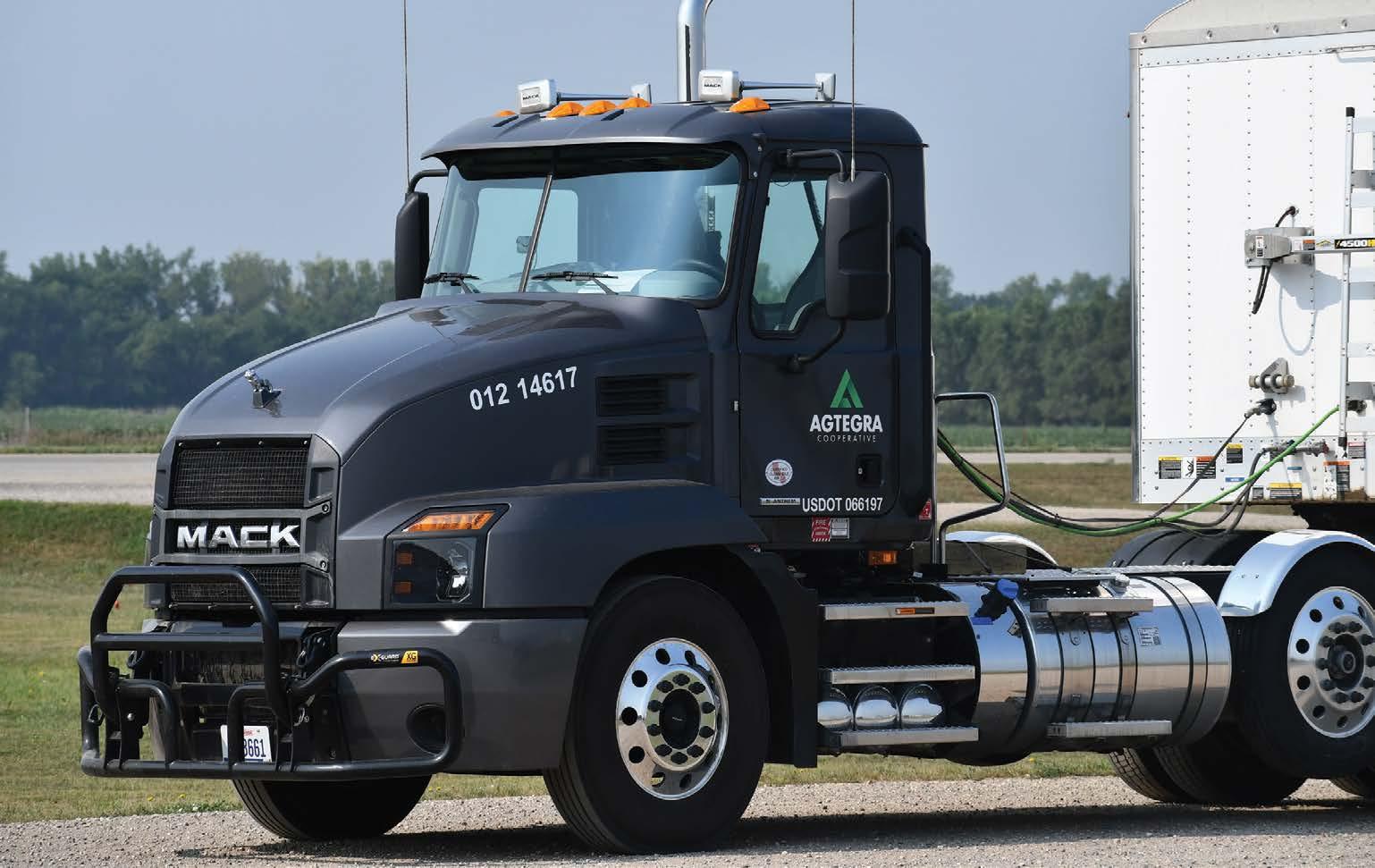HIGHLIGHTS FROM THE 89th Annual Convention
We kicked-off the 89th Annual SDTA Convention in Deadwood on Wednesday, September 25th, with our “Red, White, Blue, and You” theme. Everyone arrived in their patriotic attire, eager to collaborate and learn more about the trucking industry.
We are grateful to Sarah Rajik, the COO of the American Trucking Associations (ATA), for taking the time out of her busy schedule to fly to Deadwood, SD, to address our members. She discussed top industry issues and shared ATA’s strategic priorities, highlighting topics such as electric vehicles, federal tax reform, and truck parking.
On Thursday, our group split. Half of us teed off at the picturesque Boulder Canyon Golf Club in Sturgis, while the other half embarked on a thrilling side-by-side ride through the scenic trail systems in the Deadwood area. We felt truly fortunate to enjoy the stunning late September weather!
After dinner on Thursday evening, the big screen lit up with an action-packed football game, setting the stage for the annual cornhole tournament. Jeremy Humpal, TranSource Truck & Equipment, Sioux Falls and Corey Sundseth from Allstate Peterbilt of Rapid City & Fargo, ND seized the coveted title of 2024 Cornhole Champions! Their victory allows them to proudly display their trophies until 2025, when they will have to defend their championship.
Friday was chalked full of education and sharing. Our first presenter was Hoon Ge, president and founder of MEG Corp. Hoon is a chemical engineer with 40 years of experience in the fuel industry, including refining, additive formulation and alternative fuels. He discussed diesel, biodiesel, gasoline, ethanol, fuel additives and best practices for tank management.
In our second session, we conducted a two-hour roundtable discussion. Our large group was divided into four smaller groups that rotated around the room to four stations. Station 1 was led by Eric Cuypers, Detroit Trucks, Station 2 featured updates from the SD Highway Patrol & FMCSA , Group 3 provided updates from the SD Motor Vehicle Division, and Group 4 focused on “Workplace Violence: What You Need To Know” by Kelly Marshall, RAS Companies. We appreciate the companies who dedicated their morning to share valuable information with our members.
Michelle Wells | Member Manager | SDTA
Thursday, September 26
Friday, September 27
At the Awards Luncheon, the South Dakota Highway Patrol honored Western Provisions, Sioux Falls, with the 2024 Partnership in Safety Award. The Highway Patrol selects an SDTA member company that has gone above and beyond to increase their CSA Safety Scores and run a safety-conscious company throughout the year. Congratulations to Larry DeGroot, Western Provisions, Sioux Falls, and his sons, Justin and Jason, and their staff for a job well done.
The Fleet Safety Awards were handed out at the Awards Luncheon with the following recipients receiving plaques in the following categories based on miles traveled in South Dakota:
1-149,999 Miles: Bob Willey Trucking, Gettysburg, SD
150,000 - 299,999 Miles: Fousek Farms & Trucking, Armour, SD
300,000 - 449,999 Miles: Dixon Bros., Inc., Newcastle, WY
450,000 - 599,999 Miles: T-Brothers Trucking, Sioux Falls, SD
600,000 - 749,999 Miles: Quality Transportation, Inc., Rapid City, SD
1-1.75 Million Miles:
K&J Trucking, Inc., Sioux Falls, SD
1.76 - 2.4 Million Miles: Cliff Viessman, Inc., Gary, SD
2.5 - 4 Million Miles: Johnson Feed, Inc., Canton, SD
Over 4 Million Miles: Agtegra Cooperative, Aberdeen, SD
Of all plaque winners, a company is selected to receive the Fleet Safety Grand Champion Award. This year’s winner is T-Brothers, Sioux Falls, SD. This prestigious honor is bestowed upon a company that consistently prioritizes safety and goes above and beyond to ensure the well-being of its fleet. Join us in celebrating T-Brothers’ outstanding commitment to safety.
Joe Sandoval was awarded a Lifetime Achievement Award at the Awards Luncheon. Joe Sandoval, a towering figure in the trucking industry, has recently retired after decades of unwavering dedication. Joe’s impact on the industry has been profound, and his selfless commitment extended beyond professional duties. Thanks, Joe, and congratulations.
David Bell, representing NADA’s American Truck Dealers Association, took the stage to kick off the afternoon session. As the recognized voice of commercial truck dealers, the American Truck Dealers (ATD) division of NADA serves as your premier source for advocacy, industry relations, and education. David engaged the audience with a compelling discussion on the impact of EPA mandates, CARB rules, and the challenges hindering the widespread adoption of electric vehicles.
Friday afternoon the twelve drivers recognized as SDTA Driver’s of the Month from September 2023 to August 2024 were each invited to participate in a six-minute interview with a panel of three judges. The driver who received the highest accumulative score at the end of the interview process is recognized as the SDTA Driver of the Year.
K&J Trucking, Inc.)
Congratulations to Loren Moak, Agtegra Cooperative, who was named the 2024 Driver of the Year. With 22 years of experience as a professional truck driver, Loren has consistently demonstrated exceptional safety and courtesy while delivering propane in challenging weather conditions. Congratulations to Loren for this well-deserved recognition!
L to R: Ray Vorhees, Warren Transport; Jimmy Snipes, Rude Transportation; Arlin Delbridge, Trimac Transportation; Mark Hungerford, Johnson Feed, Inc.; Robert Grape, Johnson Feed, Inc.; Royce Danielson, Bulk Transport Company West; Loran “Balls” Dykstra; Jeremy Senger, FedEx Freight, Inc.; Brad Hendriks, K&J Trucking, Inc.; Robert Hamilton, K&J Trucking, Inc.; and Loren Moak, Agtegra Cooperative (Not pictured: Theron Thompson,
L to R: Christine Vinatieri-Erickson, SDTA President; Larry DeGroot, Western Provisions; and Lt . Matt Koll, SD Highway Patrol.
L to R: Heather Ruth, T-Brothers; Joe Sandoval; and Lt . Matt Koll, SD Highway Patrol.
Glade Westwood, Dixon Bros, Inc. was named the 2024 Safety Director of the Year. He is an indispensable figure at DBI, spearheading safety meetings and training sessions at truck terminals across several states. As the company’s Mine Safety & Health Administration (MSHA) trainer, Glade prioritizes thorough training for drivers and has earned genuine respect from them. His commitment to prioritizing training has earned him genuine respect from the company’s drivers. Glade is a safety professional with a deep understanding of the driver’s experiences on the road. Congratulations to Glade for this well-deserved recognition!
Chairman Bob Willey proudly announced the recipients of the prestigious 2024 Chairman’s Award: the South Dakota Road Team Captains Gary Schmidt, Jeff Eschen, Jeremy Senger, and Mike Whitehead. These outstanding individuals have been recognized for their unwavering commitment to promoting safety. Captains Schmidt and Whitehead have been integral members of the SD Road Team since its inception in 2016, while Captains Eschen and Senger joined the team in 2019, bringing fresh perspectives and dedication to the cause. Together, these four champions tirelessly travel around South Dakota, sharing their knowledge with driver’s education classes, CDL classes, and even preschool classrooms, advocating for safe coexistence with trucks on the road. Their well-deserved recognition is a testament to their relentless efforts and dedication to the industry.

At the close of the SDTA Convention, outgoing Chairman Bob Willey confidently passed the reins to incoming SDTA Chairman Justin Anders of Anders Trucking, Union Center.
We express our gratitude to Bob for his exceptional leadership and support for SDTA. We eagerly anticipate Justin’s leadership as we continue to make strides forward.
Allstate Peterbilt of Fargo & Rapid City
Avera Occupational
Bendix CVS
Butler Machinery Company
Colonial Life
Cottingham Butler
Cummins Sales & Service
DCI dba Polar Service Center
Firstline Funding Group
Prepass Safety Alliance
RAS Companies
SDTA Safety Management Council
South Dakota Highway Patrol
Workforce Occupational Medicine
Congratulations to on being named the 2024 Pride of the Show !
L to R: Mike Whitehead, Jeff Eschen, Gary Schmidt, and Jeremy Senger
DIAMOND
Acrisure
RAS Companies
PLATINUM
Floyd’s Truck Center
Great West Casualty Company
Their Acrisure Truck Group Affiliated Agencies:
- Baldwin-DeBates Insurance, Inc.
- Midwest Truck Insurance
- Quality Truck Insurance
- Transportation Insurance Services
- Truck Insurors
Pomp’s Tire & Yokohama Tire
GOLD
Agtegra Cooperative
Allstate Peterbilt of Fargo & Rapid City
Bendix CVS
Colonial Life
Drivewyze
I-State Truck Center
North American Truck & Trailer
- Black Hills Truck & Trailer
- Sioux Falls Truck & Trailer
- Watertown Truck & Trailer
Norpass
North Central International
Peterbilt of Sioux Falls
Prepass Safety Alliance
Transport Refrigeration
Wilson Trailer Company
Thank you to Cliff Viessman, Inc., Gary, SD, for their bid of $1,250 on this year’s SD Convoy for Special Olympics prints.
Half of the money raised goes to the SD Special Olympics, and the other half goes to the South Dakota Trucking Foundation, the fund from which we issue our SDTA scholarships annually. We appreciate their support!
SILVER
Alvin & Connie Scholten
Butler Machinery Company
Crossroads Trailer Sales & Service
DCI dba Polar Service Center
Godfrey Brake Service & Supply
MG Oil / Heartland Transportation
The First National Bank in Sioux Falls
BRONZE
Cummins Sales & Service
Dakota Riggers & Tool Supply Inc.
Drivers Legal Plan
Larson Truck Sales Inc.
Midwest Peterbilt Group
Premier Compliance Inc.
SD Soybean Association
TranSource Truck & Equipment
ADDITIONAL SPONSORS
AJ Swanson, P.C.
NADA American Truck Dealers (In-Kind Sponsor)
American Trucking Associations
Bob Willey Trucking
MEG Corporation (In-Kind Sponsor)
SDTA Safety Management Council
Sprockets Fun Foundry (In-Kind Sponsor)
Rush Mountain Adventure Park (In-Kind Sponsor)
Workforce Occupational Health
Thank you to all who attended the 89th Annual Convention.
Next year’s convention will be held on:
SEPTEMBER 17-18, 2025
Grand Falls Casino & Golf Resort Larchwood, IA
2024 BALLOT QUESTIONS
2024 Ballot Question Pamphlet compiled by the Office of the Secretary of State
The text of this pamphlet is available on our website at www.sdsos.gov
The title, explanation, and effect of a vote for each ballot question were provided by the Attorney General. No other statements on this pamphlet reflect the opinion of the Secretary of State or Attorney General.
The information was compiled by the office of the Secretary of State as required by law and provided by the authors. The information does not reflect the position of the Secretary of State’s office regarding the legality or effect of the amendments or measures. The Secretary of State is not responsible for the contents, objectivity, or accuracy of the statements written by the proponent and opponent authors in this brochure.
12-13-23. Distribution of public information. The secretary of state shall distribute public information on any amendment to the Constitution, initiated measure, or referred law submitted to the electors for approval. The secretary of state shall compile the public information by printing a statement in support of the amendment to the Constitution, initiated measure, or referred law written by its proponents, if any can be identified, and a statement against the amendment to the Constitution, initiated measure, or referred law written by its opponents, if any can be identified. No statement written by a proponent, or an opponent may exceed three hundred words in length. The secretary of state is not responsible for the contents, objectivity, or accuracy of the statements written by the proponents and opponents. The pamphlet shall also include the attorney general's title, explanation, and a recitation of the effect of a "Yes" or "No" vote as written pursuant to § 12-13-9 or 1213-25.1; number of pages and sections in the proposed or referred language; and, if applicable, a fiscal note.
Please feel free to photocopy and distribute this pamphlet. You may also bring the pamphlet with you to vote at your polling place.
Monae L. Johnson Secretary of State
Rachel Soulek, Director Division of Elections Office of Secretary of State
500 East Capitol Ave., Ste. 204 Pierre, SD 57501
Phone 605.773.3537
Email: elections@state.sd.us
Constitutional amendments and initiated and referred measures approved by majority vote will become effective on the first day of July after the completion of the official canvass by the State Canvassing Board. (SDCL 2-1-12)
30,000 copies of this publication were printed by the Office of the Secretary of State at a cost of $0.28 each
An additional 16,000 copies of this publication were printed by the Office of the Secretary of State at a cost of $.33 each.
REPRINTED FROM THE SD SECRETARY OF STATE’S WEBSITE
Constitutional Amendment E
Title: An Amendment to the South Dakota Constitution Updating Gender References for Certain Officeholders and Persons.
Attorney General Explanation: The South Dakota Constitution became effective upon the State joining the United States in 1889. The generic male pronouns he, his, and him are used in the text of the State Constitution to reference certain officeholders or individuals.
This amendment changes the text of the State Constitution to remove the use of generic male pronouns when referencing certain officeholders or individuals. For example, when referencing the Governor, instead of saying "he shall be commander-in-chief of the armed forces of the state," the text will be changed to read “the Governor shall be commander-in-chief of the armed forces of the state." The amendment makes similar changes to other references to the Governor, as well as to references to other officeholders including Lieutenant Governor, Supreme Court Justices, and Circuit Court Judges. The amendment also makes similar changes to references in the Constitution to general classes of people such as persons, electors, and public officers.
Vote “Yes” to adopt the amendment.
Vote “No” to leave the Constitution as it is.
The text of this constitutional amendment is 11 pages long with 25 sections.
Pro – Constitutional Amendment E
Amendment E will rightfully update the language within our State Constitution to reflect our elected and appointed officials pertaining to the office in which they hold.
South Dakota has a long history of strong female representation in all three branches of government, and the Constitution should accurately reflect these esteemed members of our government.
As a mother of a little girl in South Dakota, I want all young women to realize that they can grow up to do anything they set their mind to, and they too have potential to lead our State in their profession and/or politics.
I urge the South Dakota voters to vote “yes” for this amendment. Such a vote would be a show of respect for our state’s past, present, and future female leaders!
Erin Tobin, State Senator, District 21
Con – Constitutional Amendment E
Amendment E is an unnecessary change to language in our South Dakota Constitution.
The reference to “he” in our Constitution is simply a singular pronoun. The historic use of gereric male pronouns in our constitution is proper style and form and clearly does not exclude or hinder women from holding public office.
While this seems like a minor change now, opening up the constitution in order to correct pronouns will not accomplish anything substantive, but will cost taxpayer dollars to reprint materials that are already effective in their current form.
Liz May, State Representative, District 27
Title: An Amendment to the South Dakota Constitution Authorizing the State to Impose a Work Requirement on Individuals Eligible for Expanded Medicaid Benefits
Attorney General Explanation: The Medicaid program is funded by the State and the federal government to provide medical coverage for certain low-income people who qualify for the program. ln 2022, the voters approved a Constitutional provision that expanded Medicaid eligibility for any person over age 18 and under 65 whose income is at or below 133% of the federal poverty level, plus 5% of the federal poverty level for the applicable family size.
This constitutional amendment authorizes the State to impose work requirements on any person eligible to receive benefits under the expanded Medicaid program, except for those persons who are physically or mentally disabled. The amendment does not identify any specific work requirement that may be imposed on those receiving expanded Medicaid benefits. Any work requirement proposed by the State must be approved by the federal government prior to implementation.
Vote “Yes” to adopt the amendment.
Vote “No” to leave the Constitution as it is.
The text of this constitutional amendment is two pages long with two sections.
Amendment F is based on the idea that social welfare programs are a hand-up for people facing tough times but should not be a way of life. Vote YES if you agree.
South Dakota has enacted Medicaid expansion, which extends Medicaid health coverage to adults below a certain income who are 18 to 65 years old and not disabled.
Amendment F would allow South Dakota to consider a work requirement for working-age, able-bodied adults who want to enroll in Medicaid expansion. Currently, we can’t encourage these folks to seek work or training to get back on their feet, rather than stay on government programs for the long-term.
By voting YES, we can fix the current language, which prohibits South Dakota from even considering a work requirement.
Our welfare programs should care for those who can’t care for themselves – the elderly, the young, and the disabled. Amendment F allows the state to require able-bodied, working-aged people who enroll in Medicaid to work or go to school, to support themselves and their families.
Our state already does this in other social programs, and we know how to do it.
If Amendment F passes, a work requirement will still require approval from the federal government and from the state legislature. This will allow for reasonable exceptions to the work requirement, like for parents of young children, students, those with serious health issues, or those looking for work.
Voting YES for Amendment F simply creates this option for South Dakota. It doesn’t make sense that our state constitution prohibits our state from ever considering a work requirement.
South Dakotans are hard-working people, and we believe in the value of work. Medicaid expansion, like all social programs, should be a pathway to a better future for those who receive it.
Vote YES on Amendment F.
Tony Venhuizen, State Representative, District 13
Voters approved Medicaid expansion to provide health coverage to thousands of South Dakotans and Amendment F will take away that health coverage for some of those residents.
What Medicaid expansion means for people in the gap – those with low incomes who can't get insurance through their jobs, and who can't afford insurance on their own because the costs are sky-high is that they are no longer forced to choose between medical care or rent, food, childcare, and other necessities. It also means that if they are too sick to work, they do not automatically lose access to care.
I learned how easily life gets turned upside down by a lack of coverage when I was diagnosed with cancer while building a small business. I didn’t have insurance and it was a life-changing, scary experience nobody should have to endure.
If Amendment F is approved, South Dakotans who are employed and doing all they can to support themselves, and their families, will lose healthcare coverage. We know from other states that have taken similar approaches that some will simply get lost in a blizzard of paperwork, putting government bureaucrats between patients and their doctor. Others will have to stop working because they get sick, risking losing coverage when they need it most.
Working full time while receiving cancer treatment drained me. I maxed out my sick time, struggled to get through the workday and was too fatigued at the end of the day to care for my daughter. Fighting cancer is hard work. The thought of having to report my condition to government bureaucrats every month just to keep my health insurance and continue my treatment is terrifying. Medicaid needs to stay in place as it was approved by the voters.
Support working South Dakotans and Vote No on Amendment F.
Sarah Graves, Nursing Student and Volunteer with the American Cancer Society Cancer Action Network
Constitutional Amendment G
Title: An Initiated Amendment Establishing a Right to Abortion in the State Constitution.
Attorney General Explanation: This initiated amendment establishes a constitutional right to an abortion and provides a legal framework for the regulation of abortion. This framework would override existing laws and regulations concerning abortion.
The amendment establishes that during the first trimester a pregnant woman's decision to obtain an abortion may not be regulated nor may regulations be imposed on the carrying out of an abortion.
In the second trimester, the amendment allows the regulation of a pregnant woman's abortion decision, and the regulation of carrying out an abortion. Any regulation of a pregnant woman's abortion decision, or of an abortion, during the second trimester must be reasonably related to the physical health of the pregnant woman.
In the third trimester, the amendment allows the regulation or prohibition of abortion except in those cases where the abortion is necessary to preserve the life or health of the pregnant woman. Whether an abortion is necessary during the third trimester must be determined by the pregnant woman's physician according to the physician's medical judgment.
Judicial clarification of the amendment may be necessary. The Legislature cannot alter the provisions of a constitutional amendment.
Vote “Yes” to adopt the amendment.
Vote “No” to leave the Constitution as it is.
The text of this constitutional amendment is two pages long containing one section.
Pro – Constitutional Amendment G
Politicians in Pierre have decreed that South Dakota women and girls who are raped must carry to term, thrown miscarriage care into utter confusion, and limited available treatment of extreme pregnancy complications. They need to butt out.
Let women and families live their lives. Let doctors and nurses practice their professions. Let freedom ring. That is what Amendment G will do.
Americans fought for freedom nearly 250 years ago and have been defending it ever since. No one values freedom more than South Dakotans. But two years ago, freedoms of women across America were lost when the right to abortion health care that had existed for 50 years was suddenly taken away by the U.S. Supreme Court.
Amendment G, the “Freedom Amendment,” would restore those rights here. Amendment G simply writes into our state Constitution the limited reproductive freedoms for women that until 2022 were recognized in the U.S. Constitution. Wording of Amendment G intentionally mirrors the wording of Roe v. Wade, the decision that had guaranteed women those freedoms.
Tune out the radical “right to life” political noise and just read Amendment G itself and the Attorney General’s explanation of it. Both are very short!
Like most Constitutional provisions, Amendment G will occasionally require judicial clarification, every one of which will be made by South Dakota judges. The dire predictions of unthinkable outcomes that opponents claim will occur under Amendment G are deceitful scare tactics that insult South Dakota’s judiciary and defy voters’ common sense. None of their awful scenarios played out in 50 years under Roe v. Wade as interpreted by Federal Courts. To say the same language in Amendment G would be interpreted by South Dakota courts in some radical “proabortion” way is absurd. Support Amendment G.
Nancy Turbak Berry, Chair for South Dakotas for the Freedom Amendment
Con – Constitutional Amendment G
With Constitutional Abortion Amendment G, the devil is in the details. The wording of Amendment G is unclear and vague. So, to clear up the confusion, here’s the truth about what Amendment G would do:
Abortion Amendment G would impose California and New York style abortion laws into our State Constitution. This is not a “moderate” or “middle-of-the-road” proposal.
A yes vote for Amendment G approves late-term abortion even after a baby is viable and can survive outside her mother’s womb. Most people oppose late term abortion up to birth. Amendment G goes too far.
A yes vote for Amendment G takes away parents’ rights to know when their teenage daughter is undergoing an abortion procedure. This means parents wouldn’t even be informed if their teenage daughter was being coerced into having an abortion. Don’t parents deserve the right to know when their daughter is undergoing a risky medical procedure? Amendment G takes parents' rights away.
Because Amendment G was written to benefit the for-profit abortion industry, Amendment G dangerously deregulates the abortion industry. Currently, an abortion can only be done by a licensed doctor in a safe and clean setting. But a yes vote for Amendment G prohibits South Dakota legal protections for the physical and mental health of mothers for most abortions. Abortions can have dangerous and deadly side effects. That’s why numerous South Dakota medical professionals agree: by subjecting women to unsafe, unregulated abortions, Amendment G is dangerous for South Dakota women.
Voting NO on Amendment G prohibits late-term (up to 9 month) abortions.
Voting NO on Amendment G allows loving parents to assist their daughter in a time of need.
Voting NO on Amendment G protects mothers from unsafe, unregulated abortions.
Protect babies and mothers.
Vote NO on Amendment G.
Leslie Unruh, Co-Chair of Life Defense Fund
Jon Hansen, Co-Chair of Life Defense Fund
Constitutional Amendment H
Title: An Amendment to the South Dakota Constitution Establishing Top-Two Primary Elections.
Attorney General Explanation: Currently, to appear on the general election ballot, major party candidates for the following offices must participate in a partisan primary election: Governor, State Legislature, U.S. Senate and House of Representatives, and elected county offices. Only members of the candidate’s party may vote for that candidate unless that party has opened the primary to voters not affiliated with the party.
Minor party candidates may be chosen by primary or party convention.
Unaffiliated candidates (independents) are only required to file nominating petitions to appear on the general election ballot.
For the listed offices, this amendment requires one primary election wherein all candidates run against each other in their respective races, including major and minor party and unaffiliated candidates. A candidate may list any party next to their name on the ballot regardless of party affiliation or registration. All voters may vote for any candidate. The two candidates receiving the most votes advance to the general election. If there is more than one candidate to be elected to an office, the number of candidates advancing to the general election is twice the number to be elected.
Primary elections may be held for other offices.
The amendment may be challenged on constitutional grounds.
Fiscal Note: Open primaries would require printing additional ballots at a cost of $0.47 per ballot. The additional cost statewide to counties would currently be approximately $23,667 for each primary election. The share of the total cost for each county will vary. There is no expected cost to state government.
Vote “Yes” to adopt the amendment.
Vote “No” to leave the Constitution as it is.
The text of this constitutional amendment is two pages long containing one section.
Pro – Constitutional Amendment H Con – Constitutional Amendment H
Vote YES on Amendment H to make sure every South Dakota voter has a voice in who leads our state, taking power from party bosses and returning it to the voters.
Amendment H creates one “South Dakota Primary.” All candidates would be on a single primary ballot, all voters would receive that ballot and the top two vote-getters would advance to the general election. Most importantly, all voters would get to vote! Currently, 150,000 independent or unaffiliated voters in South Dakota are excluded from taxpayer-funded primary elections. Amendment H ensures that everyone has a meaningful voice in who leads our state by letting all voters vote in the primary elections.
Our closed primary system isn’t working anymore. Only 17% of South Dakota's voters participated in last June’s primary election, so it’s no surprise that politicians aren’t listening to voters: they are only accountable to powerful interests who dominate the primaries. Amendment H would boost turnout and competitive elections, so politicians are more likely to act on items which have broad public support.
Bottom line: Amendment H would shift power from party bosses back to the voters. It would fix an unfair system that silences the voices of 150,000 South Dakota independent voters. It would increase voter participation in elections and make our system fairer. And it would rationalize our politics and ensure elected officials focus on what’s best for all South Dakotans.
Vote YES on Amendment H to let all voter’s vote!
Joe Kirby, Republican and Chairman of South Dakota Open Primaries,
De Knudson, Republican and Former Sioux Falls City Councilor Drey Samuelson, Former Chief of Staff to U.S. Senator Tim Johnson
Political parties are foundational elements of self-government. Parties play a crucial role in every functional self-government around the world. They have played a critical role in the history of our country and our state. Parties of all kinds and in all places examine government and society, make choices on governmental policy, and give confidence to voters that office holders will act along those precepts. For example, the abolition of slavery was the founding principle of the Republican Party. Candidates and office holders were able to align alongside that ideal, and give voters confidence that Republican candidates were indeed anti-slavery. Parties choosing platforms, followed by primaries where candidates for the ballot are chosen by members who support those ideals is a founding principle of modern political debate and of self-government. Open primaries might well destroy the effectiveness of our system of government by allowing outsiders to participate in selecting candidates to run for office. This idea may well substantially weaken the ability of voters to choose office holders who truly represent their values and ideals. Both major parties in our state oppose Amendment H. You should too.
John Wiik, SDGOP
Initiated Measure 28
Title: An Initiated Measure Prohibiting Taxes on Anything Sold for Human Consumption.
Attorney General Explanation: Currently, the State collects tax on the sale or use of certain goods, including foods and drinks. Many municipalities also collect these taxes.
This initiated measure prohibits the State from collecting sales or use tax on anything sold for human consumption. The measure eliminates these sources of revenue for the State.
Human consumption is not defined by state law. However, its common definition includes more than foods and drinks.
The measure does not prohibit the collection of sales or use tax on alcoholic beverages or prepared food. Prepared food is defined by law to include food that is sold heated or with utensils.
The measure may affect the State’s obligations under the tobacco master settlement agreement and the streamlined sales tax agreement. The master settlement agreement resulted from multi-state lawsuits against cigarette manufacturers for the public health effects of smoking. South Dakota’s annual share of the master settlement agreement is approximately $20 million. The streamlined sales tax agreement is a multistate program designed to simplify the collection of sales and use tax for companies selling in multiple jurisdictions.
Judicial or legislative clarification of the measure will be necessary.
Fiscal Note: Beginning July 1, 2025, the State could see a reduction in sales tax revenues of $123.9 million annually from no longer taxing the sale of anything sold for human consumption, except alcoholic beverages and prepared food. Municipalities could continue to tax anything sold for human consumption.
Vote “Yes” to adopt the initiated measure.
Vote “No” to leave South Dakota law as it is.
The text of this initiated measure is two pages long containing one section.
Pro – Initiated Measure 28
According to Feeding South Dakota, the state's largest hunger relief organization, 106,000 South Dakotans, including 1 in 6 children, are food insecure, meaning they don’t know where their next meal is coming from.
South Dakota and Mississippi are the only states that still tax groceries at the full allowable state rate. Because families with very modest incomes must spend up to 30% of their total household income on food, whereas more affluent families need spend only 7% of theirs, this means that ordinary families are spending 400% more of their total income on food than are the wealthy. That is not fair. It is time for South Dakota to let Mississippi be the only state so unfair as this.
For 20 years the state legislature has considered removing this unfair tax, but it has failed to act. Even Governor Kristi Noem, who made repealing the sales tax on groceries a key promise in her 2022 re-election campaign, could not get this done. Clearly we the voters need to do what politicians more beholden to their donors than to us have failed to do.
And remember, this amendment specifically preserves local governments’ taxing authority, so do not be misled by false claims that it will hamper local officials or result in onerous new taxes with zero chance of being enacted. These assertions are politician talk designed to mislead and scare voters into retaining a tax the politicians’ rich donors love, but which treats the rest of us unfairly.
Recent polling by South Dakota News Watch shows that 66% of South Dakotans support repealing the state’s grocery tax. When the legislature fails to act, it is time for the people to decide. Let’s make our voices heard and end this unfair tax.
Rick Weiland, Co-Founder Dakotans for Health
Con – Initiated Measure 28
IM-28 would lead to irresponsible funding cuts to essential government functions or new tax increases. It would eliminate sales taxes on MANY items other than food, cutting at least $176 million.
IM-28 would prohibit taxes on anything sold for human consumption, except alcohol and prepared food. This bad wording would eliminate taxes on tobacco (annual loss of $65 million), vaping products, CBD, toothpaste, aspirin, toilet paper, and many other products. If IM-28 passes, it would have the absurd result where sales taxes would remain on a rotisserie chicken, but not a pack of cigarettes. IM-28 would prevent cities and towns from collecting sales taxes on consumable items, leaving a huge hole in local budgets. State law says cities and towns can charge a sales tax only if it “conforms in all respects to the state tax on such items with the exception of the rate.”
This means that cities and towns can only tax the same items as the state – and if the state cannot tax “anything for human consumption,” neither than a city or town. IM-28 will eliminate funding for our communities and require cuts for law enforcement, roads, pools, and parks.
IM-28 will also reduce funding for Tribal governments via sales tax compacts with the state.
The bad wording in IM-28 is setting us up for a state income tax, or it was drafted wrong. Either way, it’s bad for South Dakota. IM-28 will cut at least $176 million each year and lead to significant cuts to education, healthcare, and state employees; or it sets us up for an income tax to fund needed services.
Vote no on IM-28.
Nathan Sanderson, Executive Director SD Retailers Association, President Coalition for Responsible Taxation, Treasurer South Dakota Against a State Income Tax
Initiated Measure 29
Title: An Initiated Measure Legalizing the Recreational Use, Possession, and Distribution of Marijuana.
Attorney General Explanation: This initiated measure allows individuals 21 years of age or older to possess, grow, ingest, and distribute marijuana or marijuana paraphernalia. Individuals may possess up to two ounces of marijuana in a form other than marijuana concentrate or other marijuana products. Individuals may possess up to six marijuana plants with no more than twelve plants per household. The measure also places limits on the possession of other forms of marijuana and marijuana products.
Under the measure, the possession, ingestion, and distribution of marijuana and marijuana paraphernalia remains illegal for individuals under the age of 21. Driving under the influence of marijuana remains illegal.
The measure restricts where individuals may possess or consume marijuana, such as schools or where tobacco is prohibited.
The measure allows employers to restrict an employee's use of marijuana. Property owners may also regulate the use of marijuana on their property.
The measure does not affect State laws dealing with hemp. It also does not change laws concerning the State's medical marijuana program.
The measure legalizes marijuana-derived substances considered felony controlled substances under State law. Marijuana remains illegal under federal law.
Judicial or legislative clarification of this measure may be necessary.
Fiscal Note: The state and municipalities would collect minimal additional sales tax revenue, as the measure would not decriminalize the sale of cannabis but would decriminalize the sale of cannabis accessories. Counties could see incarceration expenses reduced by $581,556 every year.
Vote “Yes” to adopt the initiated measure.
Vote “No” to leave South Dakota law as it is.
The text of this initiated measure is two pages long containing four sections.
Pro – Initiated Measure 29
IM 29 is a simple, common-sense policy that would legalize cannabis for adults 21 and over in South Dakota. By voting yes, you can protect personal freedom, improve public health and safety, and restore the will of the people.
• WILL improve public health and safety. Instead of wasting time and resources on arresting people for cannabis possession, law enforcement can focus on fighting real crime in our communities. At the same time, we can replace the illicit market with licensed businesses selling products that are tested for safety.
WILL strengthen the economy and generate new tax revenue: Cannabis businesses will create new jobs for South Dakotans, including farmers, while also providing new opportunities for a range of existing small businesses. Legalization will also reduce spending on incarceration and generate millions of dollars in new tax revenue for the state every year.
• WILL protect medical cannabis patients from arrest: For many seriously ill people, including those suffering from cancer, epilepsy, and MS, cannabis is the only medicine that can relieve their pain without debilitating side effects. Even though our state has established a medical cannabis program, access is still too difficult and too expensive for many South Dakotans.
• WILL withstand legal challenge: The measure is simpler and shorter than previous cannabis initiatives and designed to withstand any legal challenge.
• WILL NOT increase teen drug use: Measure 29 only legalizes cannabis for adults 21 or older. Studies analyzing tens of thousands of high school students in Colorado and Washington show that teen cannabis use has not increased since those states legalized cannabis for adults in 2012.
• WILL NOT increase crime rates: Analysis from states that have legalized cannabis has found that the policy does not increase crime rates.
Matthew Schweich, Executive Director for South Dakotans for Better Marijuana Laws and Quincy Hanzen, Deputy Director for South Dakotans for Better Marijuana Laws
Con – Initiated Measure 29
IM 29 opens the door for increased crime, suicide rates, traffic fatalities, workplace injuries, reduction in workforce, mental health problems and youth use. This measure would harm South Dakota children, families, communities. IM29 will:
*Harm children: If a drug is legal, children think it is safe and will try it. Marijuana is not safe! A research report on child abuse stated, “Marijuana is the substance most identified as actively used by the perpetrator in child abuse and neglect related fatalities.”
*Increased addiction rates: Research shows that marijuana is a highly addictive gateway drug that increases abuse of opioids, fentanyl, alcohol, meth and other illicit drugs.
*Increased costs to communities: With dramatic increases in emergency room visits, crime, mental health effects and traffic accidents, insurance rates and taxes increase. For every $1 in revenue, Colorado spends $4.50 in countering the damaging impact of legalization.
*Increase in crime rates: Statistics show that 50% of men and 30% of women arrested for a crime test positive for marijuana. Read our news! More violent crime in South Dakota.
*Fuels cartel presence and the black market: Colorado, Oregon, California, Oklahoma, Kentucky, and Washington are all experiencing this reality. The remoteness of parts of our states and fast growth in our cities will make it harder for law enforcement to protect you, your children and your property from the detrimental effects legalization will bring to your community.
*Increases mental health and physical health problems: Over 20,000 peer-reviewed articles link marijuana to mental health issues. AMA has linked it to heart and stroke in adults.
South Dakota already has laws that allow people to use marijuana products for health reasons. We cannot sacrifice the health and safety of our children and our communities for this addiction-for-profit industry, leaving South Dakotans to pay the price.
VOTE NO ON IM29!
Jim Kinyon, President, Protecting South Dakota Kids
Rhonda Milstead, Executive Director, Protecting South Dakota Kids
Travis Ismay, Concerned Citizens of South Dakota
Dr. Forrest Brady, MD and Dr. April A. Anderson, LPC, EdD
Title: A Referred Act to Provide New Statutory Requirements for Regulating Linear Transmission Facilities, to Allow Counties to Impose a Surcharge on Certain Pipeline Companies, and to Establish a Landowner Bill of Rights
Attorney General Explanation: The Act authorizes counties to impose, for any tax year in which the pipeline operator receives a tax credit, a $1.00 per foot surcharge on carbon dioxide pipelines. Revenue from the surcharge must be distributed as tax relief to each property owner in the county where the pipeline is installed. Any remaining revenue can be allocated at each county's discretion. No other fee may be imposed except property taxes, or fees associated with road agreements.
The Act also imposes certain requirements on carbon dioxide pipelines: pipelines must be installed to a minimum depth; each pipeline operator is responsible for damages to drain tile, and to the surface owner, caused by the pipeline; each operator is also responsible for leaks or failures of the pipeline; and any land agent acting on behalf of the pipeline must be a pipeline employee, State resident, or State licensed real estate agent. The Act also includes requirements that carbon pipeline easements be in writing, and only enforceable for a specified period of time; pipeline operators must initiate business operations within five years of the easement; and each easement is void after five years of nonuse.
Vote "Yes" to allow the Act of the Legislature to become law.
Vote "No" to reject the Act of the Legislature.
The text of this referred law is two pages long containing one section.
Pro – Referred Law 21
VOTE YES TO KEEP THE LANDOWNER BILL OF RIGHTS.
We need Referred Law 21 to protect landowners, hold pipelines, accountable, deliver property tax relief, support our agriculture economy, and keep taxes low for all South Dakotans. If this ethanol value-enhancing pipeline is going to get built in South Dakota, it needs to be on fair terms to our farmers and ranchers. We need Referred Law 21.
It includes the following benefits for landowners and all South Dakotans:
1. Tax Relief for Taxpayers/Revenue for Counties: In addition to millions in annual property taxes, 21 forces the pipeline to pay an additional dollar per year per linear foot of pipeline – half of which goes to the county and half to the landowner.
2. Leak Liability: Ensures pipelines pay for any damage caused by leaks.
3. Indemnity for Landowners: Requires carbon pipeline to indemnify landowners for liability.
4. Minimum Burial Depth: Requires carbon pipeline to be buried at least 4 ft deep, exceeding federal regulations of 3 ft.
5. Disclosure of Dispersion Models: Requires carbon pipelines to release the plume studies, so people know what happens if there is a leak.
6. Lifetime Drain Tile Repairs: Requires carbon pipelines to repair any damage to drain tile.
7. Agricultural Impact Mitigation: Requires carbon pipelines to file an ag impact mitigation plan.
8. Information Disclosure: Requires carbon pipelines to disclose landowner rights and protections in their documents. These are common sense laws that make our agricultural heritage more secure. Our state’s ethanol industry needs carbon pipelines to access new markets and enable the production of Sustainable Aviation Fuel that will add more value to the corn we grow.
Please vote Yes.
Walt Bones, farmer and impacted landowner Parker, South Dakota
Con – Referred Law 21
Referred Law 21 is a special law that advantages private, for-profit, carbon dioxide pipeline companies and their foreign investors at the expense of South Dakotans.
Heavily lobbied by pipeline companies and related industries, Referred Law 21 was amended multiple times in the bargaining process and given the misleading name “Landowner Bill of Rights”. Misleading, because no additional rights beyond those enumerated in the Constitution are endowed by this law. The ‘rights’ described are mainly provisions already guaranteed in codified law and other 2024 legislation.
Referred Law 21exempts “pipelines for the transmission of carbon dioxide” from property taxation and shields them from future tax increases and additional fees. (Sections 1 and 7)
Pipeline companies and other “transmission facilities” need only obtain a construction permit from the three Public Utilities Commissioners in Pierre to be exempted from all local zoning rules and regulations that other companies doing business in those jurisdictions must follow, including setbacks and other safety protections. (Section 6)
The meager one-dollar-per-foot surcharge pipeline companies pay to the counties is a bargain for the ability to bypass local governance. The fifty-cent portion that is shared among affected landowners is a small comfort if land was taken without consent. Section 2 is unclear, so this could be a one-time payment.
Referred Law 21 was passed to uniquely benefit the carbon pipeline industry. It encompasses three separate subjects in the title and includes subjects not stated in the title. Article III of the South Dakota Constitution forbids special laws and multiple subjects, so a constitutional challenge is likely.
“Economic Development” should never be blindly pursued at the expense of individual property rights and equal treatment under the law.
The Legislature got it wrong. South Dakota may be open for business, but we are not for sale.
VOTE NO on Referred Law 21
Jim Eschenbaum, SD PRLCA Chairman
Rules:



